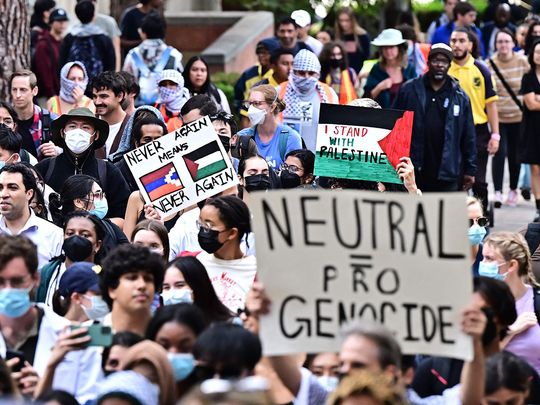
The Western world is witnessing a surge in global student activism, particularly concerning the Israeli-Palestinian conflict. Following intense protests at American universities, student groups worldwide have established “solidarity encampments” to pressure institutions and policymakers to condemn Israel’s military actions.
These demonstrations, numbering over 400 in the US alone by April 2024, and many more worldwide, demand divestment from Israeli-linked assets and the cessation of academic ties with Israel.
The growing student protests coincide with ongoing violence in Gaza and stalled ceasefire negotiations. While some universities like Brown University have engaged in dialogue, few concessions have been made.
While these student protests face opposition and police action, especially in the US, Germany, and France, campus protests have achieved modest successes, including divestment discussions and temporary halts in university relationships with military contractors. Overall, these protests amplify Palestinian human rights concerns on a global scale.
Contrast with historical leniency
While protesting students draw inspiration from past anti-war movements in the 1960s and 1970s, there are differences in scale and intensity. Unlike the violence seen in the past, the current protests have not resulted in fatal clashes with law enforcement.
However, there is a sense of tension, with fear of a potential tragic event. Despite similarities in rhetoric and activism, the overall level of engagement is deemed lower than during the Vietnam era. Campus authorities have swiftly cracked down on pro-Palestine protests, contrasting with historical leniency.
While some view the protests as antisemitic, protesting students and organisers insist they are peaceful demonstrations defending Palestinian rights. President Joe Biden has supported the right to peaceful protest but condemned violence and disruptions. Though protests have remained peaceful, authorities of several universities like Columbia in the US have used police actions to disperse protesting students.
A large number of students have been suspended, many professors have been fired from their jobs, and several student associations have been banned. Despite occasional agreements between protesters and university officials to avoid disruptions, more than 2000 students have been arrested in at least 58 crackdowns at 44 academic campuses in the US alone since mid-April.
The violent police actions against pro-Palestine campus protests can be seen as anti-democratic for several reasons. Firstly, the protests are a form of peaceful assembly and expression, fundamental rights in a democratic society. By responding with forceful police intervention, university authorities are suppressing these rights.
Secondly, the protests are a response to deeply felt grievances and concerns among students regarding Israel’s military actions in Palestine. These students are engaging in democratic activism by seeking to pressure institutional leaders and policymakers to change their stances on these matters. Police actions that hinder or prevent this activism undermine the principle of citizens’ right to petition their government for grievances.
A foundational pillar
Additionally, many of these pro-Palestine protests are met with positive reactions from peers and contemporaries elsewhere, indicating widespread support for the students’ cause. Suppressing such expressions of solidarity through police action goes against the spirit of democratic participation and free expression of ideas.
Campus activism is a potent expression of free speech and a foundational pillar of democracy. Campuses are needed to provide a fertile ground for such expressions, where students, often at Universities, as microcosms of society, are not immune to issues of injustice, discrimination, and inequality.
When students mobilise to demand changes in campus policies or practices, they contribute to a culture of transparency and accountability, ensuring that the values of fairness and equality are upheld within academic institutions.
Additionally, campus activism plays a crucial role in shaping public discourse and influencing policymaking. History has shown that many significant social and political movements, from civil rights to anti-war to environmental protection to arrest climate change, have been spearheaded by student-led initiatives.
Furthermore, campus protests and politics foster a culture of civic engagement and participation. By encouraging students to become informed about political issues, vote in elections, and engage in advocacy efforts, campuses contribute to the vibrancy of democratic governance.
Students who are politically active during their college years are more likely to remain engaged citizens throughout their lives, thereby enriching the democratic process with their diverse perspectives and experiences.
Thus, campus protest and politics in the West are not just important but indispensable elements of the equation. The pro-Palestine protests in university campuses in the West embody the principles of free speech, civic responsibility, and social justice, while also serving as catalysts for positive change and progress.
By nurturing a culture of activism and engagement among students, rather than resorting to the use of brute police force to suppress them, campuses in the West need to play a vital role in shaping the future of democracy and ensuring that its ideals endure for generations to come.









